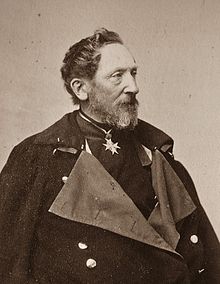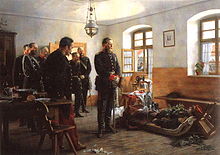Leonhard Graf von Blumenthal
Leonhardt von Blumenthal | |
|---|---|
 Field-Marshal Count Leonhardt von Blumenthal, wearing his Pour-le-Mérite | |
| Born | 30 July 1810 Schwedt, Brandenburg |
| Died | 21 December 1900 (aged 90) Quellendorf |
| Allegiance | |
| Service | Prussian Army |
| Years of service | 1827–1896 |
| Rank | generalfeldmarschall |
| Unit | 14th Infantry Division |
| Commands | IV Corps |
| Battles / wars | First Schleswig War Second Schleswig War Austro-Prussian War Franco-Prussian War |
| Awards | Pour le Mérite with Oakleaves |
Count Karl Konstantin Albrecht Leonhard (Leonhardt) Graf von Blumenthal (30 July 1810 – 21 December 1900) was a Prussian Field Marshal, chiefly remembered for his decisive intervention at the Battle of Königgrätz in 1866, his victories at Wörth and Weissenburg, and above all his refusal to bombard Paris in 1870 during the siege, which he directed.
Biography




Von Blumenthal was born in Schwedt, Brandenburg on July 30, 1810, the son of Captain Ludwig von Blumenthal, who was killed in 1813 at the Battle of Dennewitz.
Brought up on his grandfather's estate at Reddenthin, where his uncle Gustav von Below was founding what would become the Pentecostal movement, von Blumenthal was educated at the military schools of Culm and Berlin. He entered the Guards as 2nd lieutenant in 1827. He studied at the Berlin General War School (later called the Prussian Military Academy). After serving in the Rhine Province, he joined the topographical division of the general staff in 1846. As lieutenant of the 31st foot, he took part in 1848 in the suppression of the Berlin riots, and in 1849 was promoted captain on the general staff. The same year he served on the staff of General Eduard von Bonin in the First Schleswig War, and so distinguished himself, particularly at Fredericia, that he was appointed chief of the staff of the Schleswig-Holstein army,[1] when the previous chief of staff, Captain von Delius, was killed.
In 1850, von Blumenthal was general staff officer of the mobile division under Tietzen in Hesse-Kassel. He was sent on a mission to England in that year (4th class of Red Eagle), and on several subsequent occasions. Having attained the rank of lieutenant-colonel, he was appointed personal adjutant to Prince Frederick Charles in 1859. In 1860 he became colonel of the 31st, and later of the 71st, regiment. He was chief of the staff of the III. army corps when, on the outbreak of the Second Schleswig War of 1864, he was nominated chief of the general staff of the army against Denmark, and displayed so much ability, particularly at Dybbøl and the night attack on the island of Als, which he masterminded and which ended the war, that he was promoted major-general and given the order Pour le Mérite,[1] only its 50th recipient.
In the Austro-Prussian War of 1866, von Blumenthal was chief of the general staff to the crown prince of Prussia, commanding the 2nd army. It was upon this army that the brunt of the fighting fell, and its arrival at Königgrätz saved the day. Von Blumenthal's own part in these battles and in the campaign generally was most conspicuous. At Königgrätz the crown prince said to him, "I know to whom I owe the conduct of my army", and von Blumenthal soon received promotion to lieutenant-general and the oak-leaf of the order Pour le Mérite. He was also made a knight of the Hohenzollern Order. From 1866 to 1870, he commanded the 14th division at Düsseldorf.[1]
In the Franco-Prussian War of 1870–71, von Blumenthal was chief of staff of the 3rd army under the crown prince. Eighteen other members of his family also fought in this war, including both his sons and three nephews, of whom two were killed. Von Blumenthal's soldierly qualities and talent were most conspicuous in the critical days preceding the battle of Sedan, and his services in the war have been considered as scarcely less valuable and important than those of Moltke himself.[1]
Bismarck said:
So far as one can see, the papers make no mention of him, although he is chief of the staff to the Crown Prince and, next after Moltke, deserves most credit for the conduct of the war. ... He won the battles of Wörth and Wissembourg, and after that of Sedan, as the Crown Prince was not always interfering with his plans.[2]
He directed the Siege of Paris and resisted calls to bombard it. He also directed the operations conducted by General von der Tann around Orleans, and defended the Grand Duke of Mecklenburg from interference by Moltke.
In 1871, Blumenthal represented Germany at the British manoeuvres at Chobham, and was given the command of the IV. army corps at Magdeburg. In 1873, he became a general of infantry, and ten years later he was made a count. In 1888 he was made a general field marshal, after which he was in command of the 4th and 3rd army inspections. He retired in 1896, and died at Quellendorf near Köthen on 21 December 1900.[1][3]
Legacy
He was noted (among others by the English journalist William Howard Russell who followed him during the Franco-Prussian War) for his kindliness and sense of humour. Like the Crown Prince, Moltke and other key Prussian leaders, he had an English wife, Delicia Vyner and it was widely thought in conservative circles that this was the basis of a liberal Prussian clique. His least appreciated but arguably most important work was the development of the doctrine of Fire and Infiltration, the basis of Blitzkrieg.
Notes
- ^ a b c d e Chisholm 1911.
- ^ Bismarck - Some Secret Pages of His History, Being a Diary Kept by Dr. Moritz Busch - Macmillan & Co., New York, 1898
- ^ "Count Von Blumenthal Dead. Was Considered as Second Only to Von Moltke as a General and Tactician". New York Times. December 23, 1900. Retrieved 2010-12-14.
Count von Blumenthal, the oldest Field Marshal in the German Army, died last evening on his estate at Quellendorf, Duchy of Anhalt. ... but it was not so long ago that he owas regarded as second only to von Moltke in his abilities as a General and tactician. Born in 1810 at Schweldt, ...
{{cite news}}: Cite has empty unknown parameter:|coauthors=(help)
References
- Attribution
- This article incorporates text from a publication now in the public domain: Chisholm, Hugh, ed. (1911). "Blumenthal, Leonhard". Encyclopædia Britannica. Vol. 4 (11th ed.). Cambridge University Press.
Further reading
- Journals of Field Marshal Count von Blumenthal for 1866 and 1870-71, edited by his son, Count Albrecht von Blumenthal, translated by Major Gillespie-Addison, published by Edward Arnold, 1903.
- Bismarck, Some Secret Pages of His History - the diary of Dr. Moritz Busch published by Macmillan & Co, 1898
- The War Diary of Emperor Frederick III 1870-1871 translated and edited by A. R. Allinson, published by Stanley Paul & Co, 1927
External links
- 1810 births
- 1900 deaths
- People from Schwedt
- Blumenthal family
- Field marshals of the German Empire
- Field marshals of Prussia
- German military personnel of the Franco-Prussian War
- Prussian people of the Austro-Prussian War
- People of the First Schleswig War
- People of the Second Schleswig War
- People from the Province of Brandenburg
- Recipients of the Pour le Mérite (military class)
- Grand Crosses of the Order of the Red Eagle
- Commanders of the Military Order of Max Joseph
- Grand Crosses of the Military Merit Order (Württemberg)
